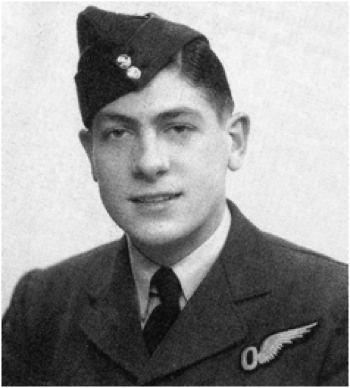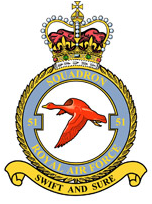Bernard Kipling was Hampshire-born and worked at Marconi Research in Great Baddow prior to the war. In June 1939 he signed up for the R.A.F. for five years, serving with Bomber Command. He was killed on the return from his fifth operational misson, a raid on Ludwigshaven, when his aircraft was shot down over The Netherlands. Two of Bernard's brothers were killed during the war. Their home was in Broomfield Road.
Bernard KIPLING, Sergeant (Observer), 51 Squadron, Royal Air Force Volunteer Reserve
Killed when his aircraft was shot down in The Netherlands. Aged 23
Two days later, at 9:54 p.m. on 5th May 1941 Bernard took off in Whitley P5106 for a raid on Mannheim, Germany. Once more his aircraft was piloted by Pilot Officer Myers with Sergeants Brown, Jackson and Selby making up the rest of the crew. Eleven other 51 Squadron aircraft participated in the raid. Bernard’s aircraft bombed the target at 1:40 a.m. from 16,000 feet with four 500 lbs, three 250 lbs bombs, plus one container of incendiaries. Heavy flak and considerable searchlight activity was observed. Bernard’s aircraft arrived safely back at base at 5:48 a.m.
At 10:58 p.m. on 8th May 1941 Bernard took off in Whitley P5106 for a raid on Bremen, Germany. Again the aircraft was piloted by Pilot Officer Myers with Sergeants Brown, Jackson and Selby making up the rest of the crew. They reached and bombed the target at 2:09 a.m. with four 500 lbs, two 250 lbs bombs, plus four containers of incendiaries. Two red fires were observed through a slight ground haze. The flak was intense and accurate. A good photograph was taken of the target by Bernard’s aircraft which landed safely back at base at 6:16 a.m. A dozen other aircraft from 51 Squadron also returned home safely.
The following evening, at 9:59 p.m. on 9th May 1941, Bernard was one of five crew members on board Whitley P5106 (makings MH-O) that took off for a raid on Ludwigshaven in Germany, his fifth and final mission. Nine other aircraft from 51 Squadron participated in the mission. The target was attacked by Bernard’s aircraft at 1:47 a.m. which dropped four 500 lbs, two 250 lbs bombs, plus four containers of incendiaries. The aircraft was heard from at 2.47 a.m. on 10th May 1941 on its return home when the operations completed message was received. At 3.05 a.m. the aircraft crashed at Boshoven in The Netherlands, having been shot down by a night fighter piloted by Lt. Reinhold Knacke.
All on board the aircraft were killed. Bernard was 23 years old. The other crew members killed in the incident were Pilot Officer (Pilot) 83257 Peter Myers (aged 27), Sergeant (Pilot) 912105 Henry Gallagher Brown (aged 22), Flight Sergeant (Wireless Operator) 939087 Arthur Jackson (aged 20), and Sergeant (Wireless Operator) 751875 George Arthur Selby (aged 21).
The morning that Bernard was killed saw Germany launch its long-expected invasion of Holland, Belgium and Luxembourg.
Today Bernard lies in Plot FF. Grave 8 at Eindhoven (Woensel) General Cemetery, Noord-Brabant in The Netherlands. His crew mates lie in adjacent graves. At the time of his death Bernard's parents were living at Ashcroft (today's number 192), Broomfield Road, Chelmsford.
The Kipling family suffered heavily from the war: Bernard's twin, Guy, was killed in June 1943 while serving in 90 Squadron, Royal Air Force and their brother, Peter Neville Kipling, was killed in 1944 while serving in the Royal Army Service Corps. All three brothers are commemorated by the Broomfield British Legion war memorial and on a stained glass window at St. Mary’s Church in Broomfield.
Their mother lived to be 105, living for 52 years after the death of her husband who died in 1943.
120128

Bernard was born in Hampshire in 1918, the son of Robert Kipling (1884-1943) and Rosa Kate Kipling (nee Knight) (1889-1995). His parents had married in Northern Ireland in 1914. Bernard's siblings were his twin Guy Kipling (1918-1941), Robert Edward Kipling (1920-2007), Peter Neville Kipling (1922-1944) and Pauline Kipling born in 1923.
Bernard worked at Marconi Research in Great Baddow before enlisting into the Royal Air Force on 26th June 1939 for five years. He became Sergeant (Observer) 754444 in 51 Squadron, Royal Air Force. The squadron flew twin-engined Armstrong Whitworth Whitley night-bomber aircraft operating out of R.A.F. Dishforth in Yorkshire.
Bernard’s first operational bombing mission against enemy targets is thought to have taken place in April 1941.
At 9.45 p.m. on 24th April 1941 Bernard took off in Whitley T4323 for a raid on Kiel, Germany, piloted by Pilot Officer Myers, and accompanied by Sergeants Francis, Jackson and Selby. Eleven other 51 Squadron aircraft participated in the raid. Bernard’s aircraft bombed the target at 1:45 a.m. from 16,600 feet with two 500 lbs, four 250 lbs bombs, and two containers of incendiaries. Explosions were observed in the target area. There was slight opposition encountered from ground defences. The aircraft landed back at base at 4:14 a.m. One aircraft from 51 Squadron was lost in the raid.
At 8:36 p.m. on 3rd May 1941 Bernard took off in Whitley P5106 for a raid on Cologne, Germany, piloted by Pilot Officer Myers, and accompanied by Sergeants Francis, Jackson and Selby. A dozen other 51 Squadron aircraft participated in the raid. Bernard’s aircraft bombed the target at 1:07 a.m. in a glide from 16,000 feet to 12,000 with four 500 lbs, two 250 lbs bombs, plus four containers of incendiaries. One red fire was observed. Intense searchlights and heavy flak was encountered. The aircraft arrived safely back at base at 5:55 a.m.
